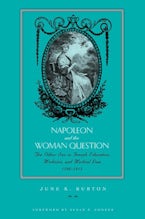Fashioning the Eighteenth Century (INACTIVE)
This series is currently inactive.
Showing results 1-1 of 1
Filter Results OPEN +

Napoleon and the Woman Question
Discourses of the Other Sex in French Education, Medicine, and Medical Law, 1799-1815
Price: $40.00
ISBN: 9780896725591
Pub Date: January 2007
Women under the Napoleonic regime have been largely neglected by historians. Through recovered discourses and other primary sources, in Napoleon and the Woman Question June K. Burton uncovers the strategies that Napoleonic women employed to control their lives. She begins with an analysis of Napoleon’s personal attitudes about the nature of women. He did not view them as weak vessels, but rather as industrious and strong, with an important role: as wives and mothers. She discusses France’s first national system of midwifery education, women’s issues in Napoleonic textbooks, the infanticide controversy, and the prevailing view of the relationship between the physical and the moral in feminine bodies and minds. In addition, she explores women’s medicine and surgery of the time with narratives from two patients, Adrienne Noailles Lafayette and Francis Burney d’Arblay. By clarifying the tensions and ambiguities of the Napoleonic period, Burton provides a nuanced approach to late-eighteenth-century and...

Napoleon and the Woman Question
Discourses of the Other Sex in French Education, Medicine, and Medical Law, 1799-1815
Price: $40.00
ISBN: 9780896725591
Pub Date: January 2007
Women under the Napoleonic regime have been largely neglected by historians. Through recovered discourses and other primary sources, in Napoleon and the Woman Question June K. Burton uncovers the strategies that Napoleonic women employed to control their lives. She begins with an analysis of Napoleon’s personal attitudes about the nature of women. He did not view them as weak vessels, but rather as industrious and strong, with an important role: as wives and mothers. She discusses France’s first national system of midwifery education, women’s issues in Napoleonic textbooks, the infanticide controversy, and the prevailing view of the relationship between the physical and the moral in feminine bodies and minds. In addition, she explores women’s medicine and surgery of the time with narratives from two patients, Adrienne Noailles Lafayette and Francis Burney d’Arblay. By clarifying the tensions and ambiguities of the Napoleonic period, Burton provides a nuanced approach to late-eighteenth-century and...

